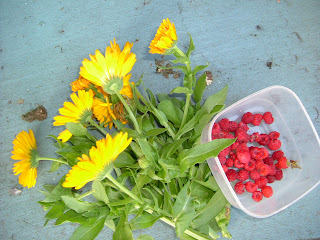I have stumbled across a crop of medlars.
I say 'stumbled' like it was part of some grand adventure. Really, the tree is just at the entrance of my sheep paddock, in the garden of a currently empty cottage on the estate. The medlar fruits are odd-looking but in an ornamental way. They are the colour of pears, the shape of an apple, but with a small star-shaped bottom end.
The tree is heaving with fruit. There could be two reasons for this: 1) no one else has found it yet or 2) everyone else knows it's there but have already tried medlar and have no desire to repeat the experience. Medlar recipes commonly appear in Victorian cookbooks - which is usually a warning sign - but not so in modern cookbooks. I fear the medlar might be an historical food which, once people were no longer forced to preserve and eat it, was allowed to disappear from the culinary landscape.
Many large estate gardens still have a medlar or a quince tree hiding in the ranks of their apple orchard, but it's more for tradition's sake than anything else. As head gardener, I offered quinces, medlars, and mulberries to the kitchen but was met with a "Good god, I'd cook and serve the floormats first!" look by most of the chefs.
But, I made mulberry jelly and that was pretty tasty, so I have faith that something can be done with a small harvest of medlars. I'm no chef, but when in doubt I have two tricks up my sleeve:
1) Partner it with apples and make a chutney or jam. Apple & medlar jelly. That sounds respectable.
2) Turn it into a liquer. Vodka and sugar could make grass clippings into something I'd drink.
I'm at a disadvantage because I don't know what medlars taste like. Are they pear-like? Sweet? Dry? Do they give off the faint aroma of wet socks? Until I've tried them once, I can't concoct recipes enhanced with spices or other ingredients to bring out the medlar's full potential (however limited).
The one thing I do know about medlars is they need to be bletted. Bletting is the action of frost on fruit, causing the water to expand in the cells and break down the flesh. The fruit is bletted when it's brown and soft. Even after last night's frost the medlars are still yellow and hard. I might have to wait until November and a good run of frosty nights before I harvest the little darlings. Maybe that's why the tree is still covered in fruit. Maybe everyone else is waiting until the medlars are bletted to claim the coveted prize.
I did collect a small harvest of calendula flowers and autumn rasperries from the abandoned garden, rather than see them go to waste -
While I cut the flowers, the lambs engaged in their own harvest the other side of the fence -
All four are doing well. They're hanging around together in a little wooly gang, leaping about and returning to their respective mothers only when their bellies are empty. I know how they feel.















